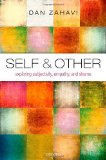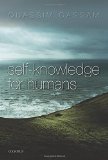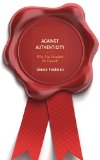January 15, 2015

Self and Other: Exploring Subjectivity, Empathy, and Shame by Dan Zahavi (Oxford University Press, 2015)
(kindle ed.), (amazon.co.uk), (UK kindle ed.)
Book description from the publisher:
Can you be a self on your own or only together with others? Is selfhood a built-in feature of experience or rather socially constructed? How do we at all come to understand others? Does empathy amount to and allow for a distinct experiential acquaintance with others, and if so, what does that tell us about the nature of selfhood and social cognition? Does a strong emphasis on the first-personal character of consciousness prohibit a satisfactory account of intersubjectivity or is the former rather a necessary requirement for the latter?
Engaging with debates and findings in classical phenomenology, in philosophy of mind and in various empirical disciplines, Dan Zahavi’s new book Self and Other offers answers to these questions. Discussing such diverse topics as self-consciousness, phenomenal externalism, mindless coping, mirror self-recognition, autism, theory of mind, embodied simulation, joint attention, shame, time-consciousness, embodiment, narrativity, self-disorders, expressivity and Buddhist no-self accounts, Zahavi argues that any theory of consciousness that wishes to take the subjective dimension of our experiential life serious must endorse a minimalist notion of self. At the same time, however, he also contends that an adequate account of the self has to recognize its multifaceted character, and that various complementary accounts must be integrated, if we are to do justice to its complexity. Thus, while arguing that the most fundamental level of selfhood is not socially constructed and not constitutively dependent upon others, Zahavi also acknowledges that there are dimensions of the self and types of self-experience that are other-mediated. The final part of the book exemplifies this claim through a close analysis of shame.
Google Books preview:
Comments (0)
- consciousness,new books,self
January 6, 2015

The Soul Fallacy: What Science Shows We Gain from Letting Go of Our Soul Beliefs by Julien Musolino (Prometheus Books, 2015)
(kindle ed.), (amazon.co.uk)
Book description from the publisher:
Most Americans believe they possess an immaterial soul that will survive the death of the body. In sharp contrast, the current scientific consensus rejects the traditional soul, although this conclusion is rarely discussed publicly. In this book, a cognitive scientist breaks the taboo and explains why modern science leads to this controversial conclusion. In doing so, the book reveals the truly astonishing scope and power of scientific inquiry, drawing on ideas from biology, psychology, neuroscience, philosophy, and the physical sciences.
Much more than chronicling the demise of the traditional soul, the book explores where soul beliefs come from, why they are so widespread culturally and historically, how cognitive science offers a naturalistic alternative to religious conceptions of mind, and how postulating the existence of a soul amounts to making a scientific claim.
Although the new scientific view of personhood departs radically from traditional religious conceptions, the author shows that a coherent, meaningful, and sensitive appreciation of what it means to be human remains intact. He argues that we do not lose anything by letting go of our soul beliefs and that we even have something to gain.
Throughout, the book takes a passionate stand for science and reason. It also offers a timely rejoinder to recent claims that science supports the existence of the soul and the afterlife.
Google Books preview:
Author interview:
Comments (0)
- new books,self
January 4, 2015

Self-Knowledge for Humans by Quassim Cassam (Oxford University Press, 2014)
(kindle ed.), (amazon.co.uk), (UK kindle ed.)
Book description from the publisher:
Human beings are not model epistemic citizens. Our reasoning can be careless and uncritical, and our beliefs, desires, and other attitudes aren’t always as they ought rationally to be. Our beliefs can be eccentric, our desires irrational and our hopes hopelessly unrealistic. Our attitudes are influenced by a wide range of non-epistemic or non-rational factors, including our character, our emotions and powerful unconscious biases. Yet we are rarely conscious of such influences. Self-ignorance is not something to which human beings are immune.
In this book Quassim Cassam develops an account of self-knowledge which tries to do justice to these and other respects in which humans aren’t model epistemic citizens. He rejects rationalist and other mainstream philosophical accounts of self-knowledge on the grounds that, in more than one sense, they aren’t accounts of self-knowledge for humans. Instead he defends the view that inferences from behavioural and psychological evidence are a basic source of human self-knowledge. On this account, self-knowledge is a genuine cognitive achievement and self-ignorance is almost always on the cards.
As well as explaining knowledge of our own states of mind, Cassam also accounts for what he calls ‘substantial’ self-knowledge, including knowledge of our values, emotions, and character. He criticizes philosophical accounts of self-knowledge for neglecting substantial self-knowledge, and concludes with a discussion of the value of self-knowledge.
This book tries to do for philosophy what behavioural economics tries to do for economics. Just as behavioural economics is the economics of homo sapiens, as distinct from the economics of an ideally rational and self homo economics, so Cassam argues that philosophy should focus on the human predicament rather on the reasoning and self-knowledge of an idealized homo philosophicus.
Google Books preview:
See also: Book website
Comments (0)
- new books,self
December 28, 2014

Against Authenticity: Why You Shouldn’t Be Yourself by Simon Feldman (Lexington Books, 2014)
(kindle ed.), (amazon.co.uk), (UK kindle ed.)
Book description from the publisher:
“Be true to yourself”—it is a dictum so ubiquitous that it can seem like both philosophical wisdom and an empty truism. Should we aspire to an ideal of living authentically? What does it mean to be true to yourself? Against Authenticity: Why You Shouldn’t Be Yourself is a philosophical exploration and critique of the ideal of authenticity. Simon Feldman argues that if being true to ourselves is a matter of maintaining a strong will, being psychologically independent, achieving self-knowledge, or being morally conscientious, then the best lives we can lead should be expected to involve substantial inauthenticity. Feldman suggests that various construals of the ideal of authenticity presuppose metaphysically confused notions of the self (for example, that there is a determinate “true self”) and that under the guise of indisputable wisdom the ideal perpetuates both objectionably relativistic as well as reactionary moral thinking. Feldman concludes that the ideal of authenticity is one that we would be better off abandoning, independent of our other moral or ethical commitments. With implications for every reader’s conception of authenticity and identity, Against Authenticity is an exciting challenge for students and scholars of ethics, metaethics, metaphysics, and moral psychology.
Google Books preview:
Comments (0)
- new books,self
November 26, 2014

Greek Models of Mind and Self by A.A. Long (Harvard University Press, 2014)
(amazon.co.uk)
Book description from the publisher:
This lively book offers a wide-ranging study of Greek notions of mind and human selfhood from Homer through Plotinus. A. A. Long anchors his discussion in questions of recurrent and universal interest. What happens to us when we die? How is the mind or soul related to the body? Are we responsible for our own happiness? Can we achieve autonomy? Long asks when and how these questions emerged in ancient Greece, and shows that Greek thinkers’ modeling of the mind gave us metaphors that we still live by, such as the rule of reason or enslavement to passion. He also interrogates the less familiar Greek notion of the intellect’s divinity, and asks what that might mean for us.
Because Plato’s dialogues articulate these themes more sharply and influentially than works by any other Greek thinker, Plato receives the most sustained treatment in this account. But at the same time, Long asks whether Plato’s explanation of the mind and human behavior is more convincing for modern readers than that contained in the older Homeric poems. Turning to later ancient philosophy, especially Stoicism, Long concludes with an exploration of Epictetus’s injunction to live life by making correct use of one’s mental impressions.
An authoritative treatment of Greek modes of self-understanding, Greek Models of Mind and Self demonstrates how ancient thinkers grappled with what is closest to us and yet still most mysterious—our own essence as singular human selves—and how the study of Greek thought can enlarge and enrich our experience.
Comments (0)
- culture,mind,new books,self,Uncategorized







